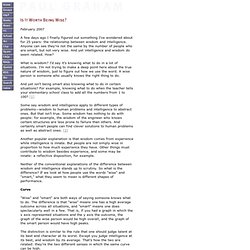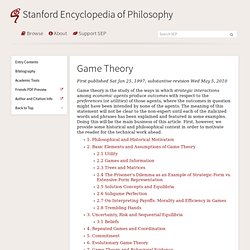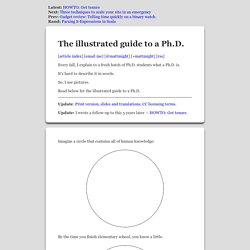

14 Mind-Blowing Facts That Will Completely Change Your Perception Of Time. Is It Worth Being Wise? February 2007 A few days ago I finally figured out something I've wondered about for 25 years: the relationship between wisdom and intelligence.

Anyone can see they're not the same by the number of people who are smart, but not very wise. And yet intelligence and wisdom do seem related. How? What is wisdom? And yet isn't being smart also knowing what to do in certain situations? Some say wisdom and intelligence apply to different types of problems—wisdom to human problems and intelligence to abstract ones. Another popular explanation is that wisdom comes from experience while intelligence is innate. Neither of the conventional explanations of the difference between wisdom and intelligence stands up to scrutiny. Curve "Wise" and "smart" are both ways of saying someone knows what to do. The distinction is similar to the rule that one should judge talent at its best and character at its worst.
Nor do we need to. Split The alarming thing is that we may have to choose between the two. New. Thinking Within Paradoxes. I read a few years ago somewhere that a hallmark of a genius is being able to hold opposites together and transcend them. This stuck with me and over time I tried to make sense of it, because at first it was a very confusing concept. With some luck this concept began to make sense thanks to a random assortment of other things I read over the years following my discovery of this tidbit. This train of thought has now become one of my favorite things to ponder. I feel it has taught me the dangers of holding onto apparent absolutes. Once you believe in something as an absolute, you are automatically precluding yourself from believing in the opposite, which means that in some ways a part of your freedom of thought as a human being is forfeited as a result.
Wave-particle duality is the concept that all matter and energy exhibits both wave-like and particle-like properties. You are nothing. They both hold some truth and meaning. You know nothing, You know everything. Alternative Sleep Cycles. Most people only think that there is one way to sleep: Go to sleep at night for 6-8 hours, wake up in the morning, stay awake for 16-18 hours and then repeat.

Actually, that is called a monophasic sleep cycle, which is only 1 of 5 major sleep cycles that have been used successfully throughout history. The other 4 are considered polyphasic sleep cycles due to the multiple number of naps they require each day. Game Theory. First published Sat Jan 25, 1997; substantive revision Wed May 5, 2010 Game theory is the study of the ways in which strategic interactions among economic agents produce outcomes with respect to the preferences (or utilities) of those agents, where the outcomes in question might have been intended by none of the agents.

The meaning of this statement will not be clear to the non-expert until each of the italicized words and phrases has been explained and featured in some examples. Doing this will be the main business of this article. First, however, we provide some historical and philosophical context in order to motivate the reader for the technical work ahead. 1. The mathematical theory of games was invented by John von Neumann and Oskar Morgenstern (1944). Despite the fact that game theory has been rendered mathematically and logically systematic only since 1944, game-theoretic insights can be found among commentators going back to ancient times. 2. 2.1 Utility. Origami. Interview Tips. Lecture by Professor Richard Dawkins at Culham Science Centre. Sam Harris - Islam and the Future of Liberalism on The Joe Rogan Experience. RSA Animate - Changing Education Paradigms.
There's no homework in Finland. The illustrated guide to a Ph.D. Imagine a circle that contains all of human knowledge: By the time you finish elementary school, you know a little: By the time you finish high school, you know a bit more: With a bachelor's degree, you gain a specialty: A master's degree deepens that specialty: Reading research papers takes you to the edge of human knowledge: Once you're at the boundary, you focus: You push at the boundary for a few years: Until one day, the boundary gives way: And, that dent you've made is called a Ph.D Of course, the world looks different to you now: So, don't forget the bigger picture: Keep pushing.

There's a bit more below, but I also wrote a follow-up 5 years after the illustrated guide which may be of interest -- HOWTO: Get tenure. Related posts If you like these posts, then I recommend the book A PhD Is Not Enough Get it in print; fund students; save lives By request, a print version of The Illustrated Guide to a Ph.D. is on sale. Click here to preview or buy it. Why biology? License: Creative Commons Resources. Growing up with scientist mom. 18 Thought-Provoking Questions.